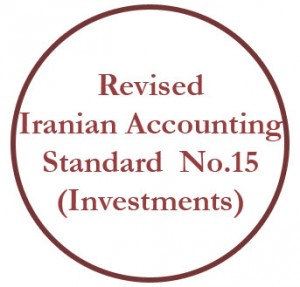The alarming signs of using the revised standard on investments.
“Published in the Donyaye Eghtesad newspaper dated 23rd Tir 1393 (14th July 2014)
By: Dr. Abbas Vafadar, CPA (Iran), Judiciary Official Expert and university lecturer.
If the revised accounting standard No.15 (INVESTMENTS) becomes operative, the investment companies and all other companies are obligated to recognize the gain resulting from appreciation in value of available for sale investments. The question is whether this gain is subject to tax or not? I, together with a number of my professional colleagues, hereby believe that based on the content of articles 143 & 143 repeated (Mokarar) of direct tax act, that this gain should not be subject to tax, however some other professional individuals believe it should be taxed.
Considering this controversy, it seems necessary that the tax authority’s view on this should be clarified now, because the company’s tax position would be greatly affected by their tax returns for the coming year ending on 29th of Esfand 1393 (20th March 2015) and the lack of knowledge on this may well have very undesirable consequences on the capital market. Based on this I have personally written a letter to the respected adviser and the office of the Minister of Economic & Financial Affairs asking for a clear statement from the “Tax Affairs Organization”on this matter.
The head of the Tax Affairs Organization has written, in the letter no 200/5916 dated 2.4.1393, that according to the direct taxes act referring to the income arising from disposal of investments, there is a clear position, but regarding gain from appreciation in value of available for sale investments, there are no clauses indicating exemptions or reliefs, hence exemption for such gains for tax payers is not foreseen because of absence of any acts or legal vehicle. In other words, Tax Affairs Organization very respectfully states that such appreciations is subject to tax.
Although I still believe that such a gain should not be subject to tax and I have delivered my reasoning in my previous articles in detail, however at the end of the day the Tax Affairs Organization now is of the belief that this is taxable, this gain which has no cash flow implications to come with it. So from which source tax could be paid?
Hence it should be alarming for investment and other companies which have investments. Should the company act according to the accounting standard No.15 (revised), it must pay 25% tax on such gains, with no cash inflow implication, if the company does not act according to this standard and the effects of this is material, then this is going to have to be referred to as an audit report qualification of non compliance with accounting standards and the auditor is expressing a qualification or disagreement in which case the tax affairs organization will act on this and issue a tax assessment on this to claim the tax.
The other important point is the severe consequences of this action on company’s operation results, and even more important, consequences of such taxes on the Securities and Exchange Organization which has already quite a few downturns of the index and can hardly afford such consequences.
Now what is the solution? Follow up this matter from tax affairs organization and proving that this gain on capital appreciation is not subject to tax and requesting a circular to be issued on this? Asking for the opinion from the High Council of Taxes in this respect?
Waiting for the tax assessments to be issued by the Tax Affairs Organization and then appeal in the “Administrative Justice Court” (Divan Edalat Edari)? Reviewing of this standard by Audit organization? Delaying the operative date of this standard by the Audit organization until the tax position is clarified and finalized? Modifying the direct taxes acts by delivering a “single article” (Madehe Vahede) to the parliament consisting of tax exemptions for this gain to be granted? Or accepting such taxes on this type of gains and go forward?
Ministry of Economic & Financial Affairs, Tax Affairs Organization, Audit Organization, Securities and Exchange Organization, IACPA, Council of Investment Institutes and companies are all engaged in this matter and have to find a solution to this problem. May be by forming a workshop consisting of the a.m. organizations’ representatives to assist on finding a solution.


